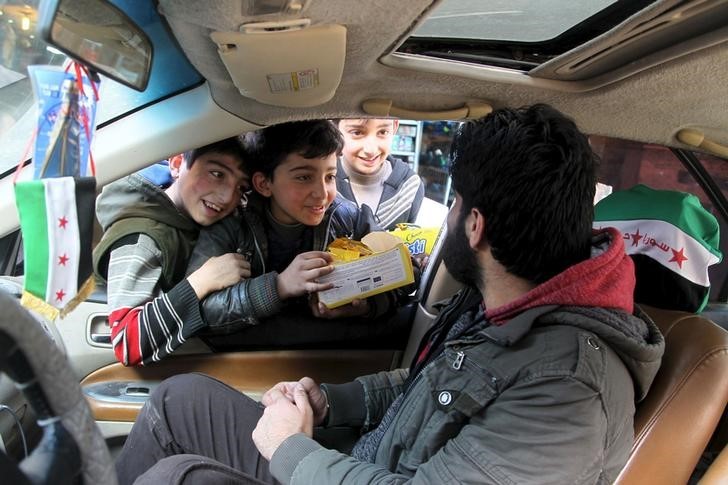
AMMAN (Reuters) – In the devastated Syrian city of Aleppo, children are outside playing and many people are going to the shops safely for the first time in months thanks to a partial halt to the war that is providing relief even if most doubt that peace will take hold.
“Look at the markets. Where were all these people hiding?” said a bewildered Mahmoud Ashrafi, speaking to Reuters by telephone after picking through opposition-held areas of Aleppo wrecked by barrel bombs and air strikes.
While the “cessation of hostilities” has fallen short of halting the five-year-long war across the country, parts of Syria have enjoyed an unusual period of peace since the U.S.-Russian agreement came into effect on Saturday.
The United Nations hopes the agreement will allow for peace talks to get under way towards settling the conflict that has killed more than 250,000 people and created refugee crises in the Middle East and Europe. More aid has been delivered into opposition-held areas since the agreement came into effect.
Just a few weeks ago, Syrians in opposition-held parts of Aleppo were trying to leave, fearing President Bashar al-Assad’s advancing forces were about to impose a siege after cutting rebel supply lines north of the city.
But this week, some of those who fled Aleppo, which has seen some of the Syrian war’s worst bombing and house-to-house fighting, have returned.
Aleppo resident Jamila al-Shabani said she had been out seeing parts of the city she had not visited in a long time because of what she described as her “self-imposed confinement” at home. “People were afraid to go out,” she said.
“The park yesterday was a beehive where children and families flocked,” added Abdullah Aslan, another Aleppo resident contacted by Reuters. “It was lovely and sunny. The park was full, people now when they go out with their families feel safer,” he said.
Before the war, tourists enjoyed Aleppo, Syria’s second city and one of the oldest inhabited in the world. Architectural gems — bathhouses, palaces, churches and mosques — studded Aleppo’s streets, making it one of the richest historical sites in the Middle East. Souks that traced their history back four millennia sold spices, the city’s trademark laurel soap and the antique textiles that were coveted in Europe.
BUSTLING MARKET
Residents contacted by Reuters described bustling scenes in the market, some likening it to the last-minute rush before the start of a big religious holiday. “People are more assured,” said Abdul Munim Juneid, an orphanage supervisor.
On the other side of the city, which is under government control, residents have also noticed a drop in insurgent shelling. But like Syrians in rebel-held territory, residents remain cautious and fearful. “Now, to a small degree, it is different. But there is still fear that any moment they will shell peaceful neighborhoods,” said 28-year-old Suheib Masry.
Both rebel groups and the Syrian government say they are respecting the cessation of hostilities agreement, while accusing each other of violating it.
The pace of the war is virtually unchanged in some parts of northern Syria, notably on frontlines near the border with Turkey where rebels report attacks by government forces seeking to seal the frontier.
The government is saying little about military operations in those areas, where rebel forces viewed as moderate by the West fight in close proximity to jihadists who are not included in the cessation of hostilities agreement.
While the government says it is cooperating with international efforts, the opposition is voicing deep misgivings. It says aid deliveries are reaching a fraction of those in need and that Assad is pressing his war effort in violation of the agreement.
Army helicopters have dropped leaflets calling on rebels to lay down their arms and vowing to fight those who resist.
“CALM BEFORE THE STORM”
Residents in the town of Jisr al-Shughour, captured by rebels from government forces last year, fear it is only a matter of time before the next offensive begins. They say there has been no let up in government shelling there.
“There is a lot of fear. There is paralysis with no buying or selling and those who have assets are trying to get rid of them,” said Abdullah Akhras, talking from a village near the town. “It’s the calm before the storm. This truce is nothing more than a preparation for a huge battle. They (the government) are now amassing forces to begin on every front.”
Still, in opposition-held areas near Damascus people are using the relative calm to see to long-neglected tasks such as repairing damaged homes and even tending to gardens.
“We now see the kids in the neighborhood going and coming and playing,” said Badran al Doumi, owner of a furniture store in the city of Douma to the east of Damascus.
The noise of vehicles has replaced the sound of warplanes that so frequently bomb the area, residents say.
Instead of carrying reports on casualty tolls from government attacks, the social media feed of a civil defense service operating in the area showed rescue workers repairing vehicles, cleaning mosques, and hosting a children’s party.
Just 5 miles away across the frontlines in government-controlled areas of Damascus, 60-year-old Samira al-Shawki hoped the calm would last. “The sounds of blasts are fewer to a degree, but we want it to stay this way,” she said.
(Additional reporting by Kinda Makieh in Damascus and Tom Perry in Beirut; Editing by Tom Perry and Peter Millership)







